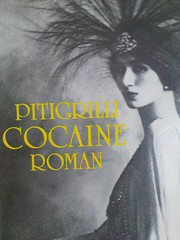My edition of Cocaine (in a 1982 translation by Frédérique Van Der Velde for the Dutch-language imprint Goossens, which also published translations of Thérèse philosophe, Villon, and Aretino)
“Not since Of Human Bondage have I read a more poignant rendition of the human condition,” and “after The End Of The World Filmed By An Angel possibly the second surrealist novel” wrote American literary critic Sholem Stein in a rare review of Cocaina in 1922.
Cocaina is a 1921 Italian novel written by Pitigrilli, a pseudonym of Italian journalist and author Dino Segre.
The novel, set in Paris and dedicated to cocaine use, was banned when it was published due to its liberal use of explicit sex and drugs.
The protagonist is Tito Arnaudi, a young Dostoevskian nihilist who travels from his home town Turin to Paris after a failed love story. There he discovers the joys of cocaine, takes a job as a journalist and meets two women: the exotic and orgiastic Kalantan Ter-Gregorianz and the tawdry cocotte Maud Fabrège. Maud, who later in the story is renamed to Cocaina (she is the personification of the effects of cocaine, at first lively and spirited, later jaded and blunt) is his femme fatale. Tito falls in love with her despite her apparent infidelity and despite of her sterilization which he knows is bound to make her ugly and less feminine.
The novel is full of unabashed male opinions on women and love and ends with an original “Russian roulette” twist.
I read in three days, and never felt the urge to quit reading. I laughed out loud at least three times. An underrated masterpiece. See also drugs in literature and cocaine in literature.
More covers:



